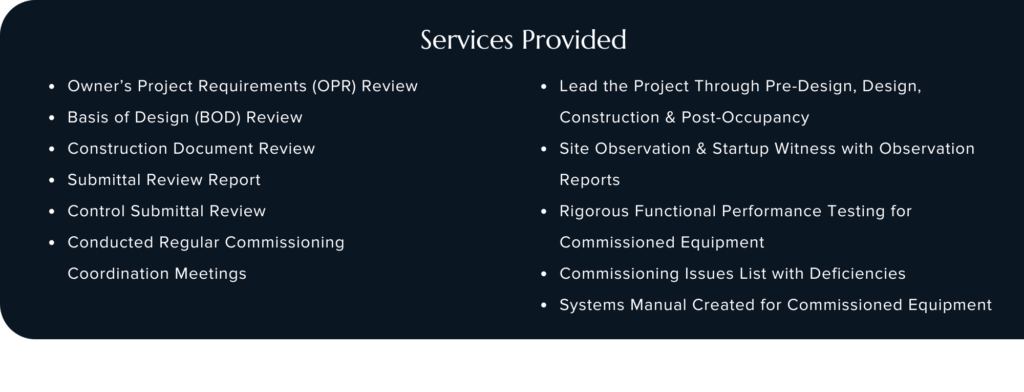AT A GLANCE
The Performance Validation Team completed a comprehensive commissioning project for the Quileute Tribal School in La Push, Washington. This K-12 school serves as a vital educational hub for the students of the tribe while also doubling as a central community space. The previous school was built right off the water posing safety issues for occupants due to the high risk of flooding and mud slides. By moving inland, the new facility not only mitigates weather-related risks but also offers a larger area for learning, activities, and gatherings.
In addition to moving the school to a more conducive location, there was a primary focus on delivering energy efficiency, operational proficiency, and system functionality. The new school encompasses 60,950 square feet of classrooms, vocational education, therapy, and resource rooms in addition to administrative spaces, and a gymnasium among several others. The success of the project was based on effective communication and diligent collaboration with the primary stakeholders to ensure timely completion, compliance, and budget delivery.
Our engineering team leveraged their expertise to deliver a thorough commissioning process leveraging the Washington Sustainable Schools Protocol (WSSP) E4.0 Fundamental Commissioning and E4.1 Enhanced Commissioning. This involved meticulous analysis of the HVAC, building automatic system, domestic hot water, lighting control system, and utility metering systems. Specific areas of focus included the outside air systems, ceiling and exhaust fans, water heaters, electric meters, VRF systems, and more. Through detailed testing, the team was able to ensure the systems were not only meeting the project and certification goals, but they were also operating optimally for enhanced system performance.
Beyond its role as an educational institute, the Quileute Tribal School stands as a multifunctional space that fosters community engagement and collaboration. By creating a cross-functional environment, the school serves the needs of students and surrounding tribal communities.
Elevating Building Standards with WSSP Compliance
The commissioning of the Quileute Tribal School was driven by the Washington Sustainable Schools Protocol (WSSP), designed to foster both sustainability and efficiency in educational facilities. Aided by the expertise of the Performance Validation Team, this project exemplifies the benefits of adhering to stringent sustainability standards for the long-term viability of school facilities.
With a track record of successfully achieving commissioning compliance for well over one hundred WSSP projects, our team approached this building with a deep understanding of the protocol’s requirements and an efficient route of execution. Ensuring that each phase of the commissioning process aligned seamlessly with the sustainability goals for compliance. The coordination of our process with the protocol’s objectives was instrumental in securing the state-matched funding, in addition to delivering a facility that is designed for efficient and sustainable operation.
Our approach to WSSP compliance begins with a detailed review of the Owners Project Requirements (OPR) and Basis of Design (BOD), laying the foundation for the sustainability-driven design. Throughout the commissioning process, our qualified engineers conducted comprehensive assessments and verifications across all building systems, including HVAC, domestic hot water, building automation, lighting controls, and utility metering. This meticulous approach ensured compliance with WSSP standards regarding energy use, water conservation, and indoor environmental quality, ultimately contributing to the development of a healthier and more sustainable learning environment for the Quileute Tribal School community.

Optimizing Building Systems
The Performance Validation Team conducted comprehensive commissioning across the 60,950 square feet of diverse building spaces including classrooms, vocational education, therapy, resource rooms, administrative spaces, and a gymnasium among others. With the underlying objective of enhancing operational efficiency, achieving energy savings, and ensuring compliance with the Washington Sustainable Schools Protocol (WSSP).
The project scope encompassed the HVAC, domestic hot water, building automation, lighting controls, and utility metering. There was considerable attention and dedication to optimizing the heat pump water heaters, instant water heaters, and circulators to deliver desired temperatures effectively.
The team took a unique approach to the domestic hot water systems as the building systems were storage tanks. These were implemented due to the remote location of the school where there is not a continuous water flow. Testing procedures included heating the water to 135 degrees, opening all access points for drainage, and monitorization of the refilling process to ensure the water regained the optimal temperature setpoint. This process presented a valuable learning opportunity for our engineering team, given the relative rarity of the system in a standard school facility.
During the functional testing and back-check of the units, our team pinpointed a critical update for the server rooms. By recommending locking out heating operation in these rooms, we proactively addressed potential overheating issues, providing a cost-effective solution for the maintenance team.
Through persistent efforts and engineering expertise, all installed HVAC, domestic hot water, building automation, lighting control, and utility metering systems were meticulously verified and optimized. This fulfills the functional requirements for the school’s maintenance team and ensures related WSSP compliance but, most importantly, ensures occupant comfort.
Strategic Flexibility: Navigating Challenges with Solutions and Adaptability
Throughout the commissioning of the Quileute Tribal School, our team encountered and navigated a series of challenges. Each obstacle was met with a strategic approach aimed at achieving a lasting solution. Through diligent communication and collaboration with primary stakeholders, we ensured the project remained on track, adhering to the delivery timeline and budget.
One notable challenge was accessibility due to the remote location of the project site; this necessitated adjustments to the types of systems utilized to facilitate proper testing and verification. Initially the building was scoped to use heating and cooling units from a DOAS system with a complex design. However, the logistical difficulties and high cost associated with testing support led to the adoption of a VRF system. As it requires less maintenance and offers greater compatibility with the school’s maintenance staff expertise.
Additionally, significant issues emerged within the plumbing systems. Initially the sewage piping was installed incorrectly which drove the aroma of sewage throughout the building entirely. Although sewage systems were not initially within the commissioning scope, their impact on other plumbing components necessitated attention. Additionally, inadequate heating in storage tanks was present due to a poorly calibrated mixing valve that was identified during onsite testing. A new mixing valve with mechanical hard set allowed for water to obtain optimal temperatures. Collaborative efforts with the general and plumbing contractors led to the implementation of corrective measures, ensuring consistent water temperatures throughout the building.
Despite these challenges, our proactive commissioning approach enabled our experienced team of engineers to troubleshoot effectively, delivering long-term solutions. Our commitment to dynamic collaboration and adaptability in continually refining the commissioning plan as needed played a pivotal role in overcoming obstacles. These efforts concluded in the successful delivery of the project, where all systems met both owner requirements and design intent.
Long-Term Operational Excellence
At the conclusion of the project, the Performance Validation Team delivered a comprehensive functional testing summary and detailed commissioning report to present system findings with the school’s owner. The documentation serves as a user-friendly guide for the school’s facility and maintenance staff, enabling them to conduct future testing and re-commissioning as needed.By providing their team with this knowledge, we can empower them to maintain the optimal system performance post occupancy.
The Performance Validation Team’s commitment to excellence extends beyond the completion of the project. We remain committed to treating each building as our own, driving our dedication to equipping the Quileute Tribe with the necessary tools and knowledge needed to uphold the building operations efficiently and effectively for years to come.
Project Summary
The Quileute Tribal School stands as a remarkable achievement for sustainability and building excellence, serving as a progressive facility in La Push, Washington. From the initial stages of the project the overarching goal was to foster compliant and efficient systems while nurturing the creation of a community hub for the Quileute Tribe.
Aligned with the detailed criteria of the Washington Sustainable Schools Protocol (WSSP), our team executed a proactive commissioning approach, ensuring not only the attainment of essential funding but also the enhancement of operational efficiency. Our unwavering commitment to delivering solutions and results to our client enabled us to adapt and pivot effectively.
The Performance Validation Team was able to provide the Quileute Tribe with a WSSP compliant educational facility through a proactive commissioning approach. The facility will empower both education and community engagement, driving a sustainable future for years to come.
